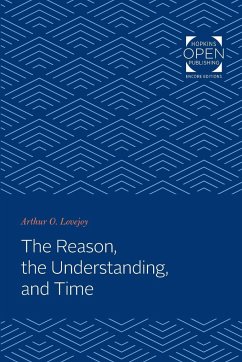Originally published in 1961. Professor Lovejoy is concerned with the history of the conceptions of reason, ego, time, and other related concepts that enjoyed a great vogue and influence in German philosophy in the last decades of the eighteenth century and the early decades of the nineteenth century. Kant's influence on and relevance to the development of later German epistemology is traced, as is the impact of those ideas on the Transcendentalist movements in England and America as represented by Coleridge, Carlyle, and Emerson. The significance of Jacobi's philosophy, hitherto not fully appreciated by historians, is demonstrated as well as the contribution of the young Schelling. By examining Bergson's letters, Lovejoy throws new light on Bergson's concept of time. Lovejoy's philosophical interpretation is a model of penetrating insight and helpful criticism.
Hinweis: Dieser Artikel kann nur an eine deutsche Lieferadresse ausgeliefert werden.
Hinweis: Dieser Artikel kann nur an eine deutsche Lieferadresse ausgeliefert werden.








